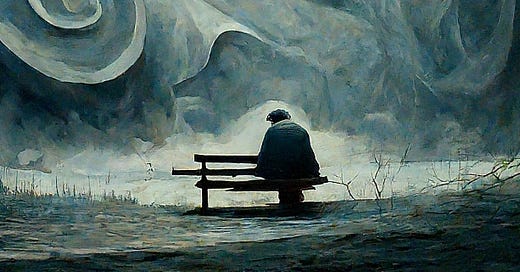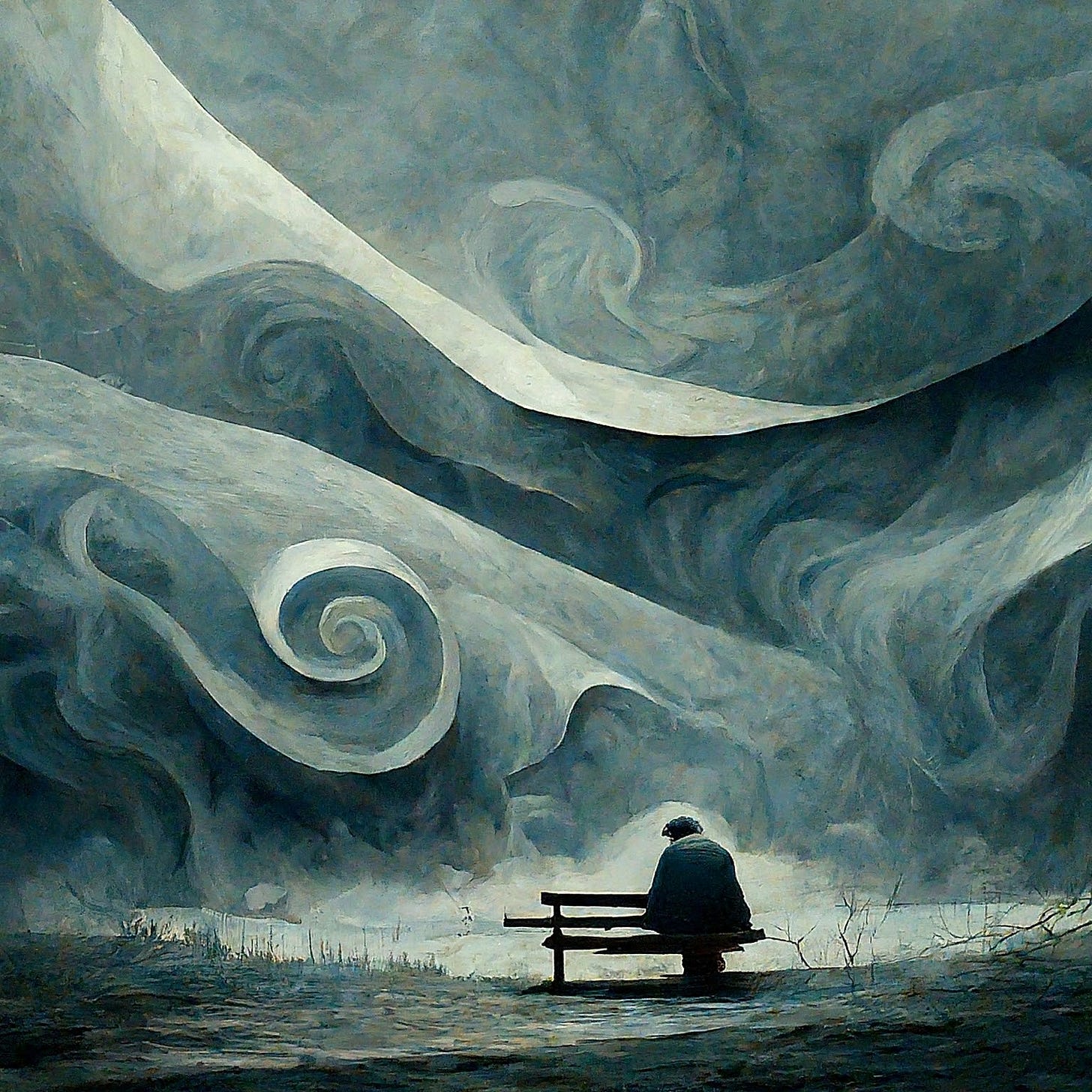☢️ Are People Dying of Loneliness?
Extended social isolation is linked to a 16% greater risk of mortality
According to a 2024 poll by the American Psychiatric Association, 30% of US adults feel lonely at least once a week while 10% feel lonely every day.
These are enormous numbers, and they matter because social interaction is an essential human function. Social groups are how we find support, share interesting news, find love, and build families. The happiest experiences in life tend to emerge when we are in good company.
New research is painting a dire picture of just how bad the consequences of feeling alone can be. Understanding the relationship between loneliness and longevity is an important step in working out what we should do about it. So I’ll highlight some recently published evidence showing that social isolation doesn’t just hurt; it may be silently killing people.
☠️ Social isolation increases your risk of death
In a study published at the end of 2023, researchers analyzed data from 9,032 participants in the US Health and Retirement study across a 23-year period from 1996 to 2019. This is a survey that runs every 2 years among people aged 50+.
In the first 8-year window from 1996-2004, the researchers extracted loneliness data. This was based on a question asking “do you feel lonely?”. In each survey, people could respond with yes or no, and the researchers looked at cumulative experiences of loneliness across 5 phases of the survey. They split people into groups defined by their total number of lonely periods: no periods of loneliness, 1 period of loneliness, 2 periods of loneliness, or 3+ periods of loneliness.
For the final 15-year window from 2004-2019, the researchers looked at deaths from any cause among the survey population. They investigated whether the amount of loneliness people suffered in the first 8 years of surveying would predict their likelihood of death in the second window.
These kinds of research projects are correlational by necessity. For obvious reasons, you can’t run an experiment that forces a random subset of people into extended loneliness to see whether they die earlier. But the problem with correlations is that they can’t tell you for sure whether loneliness actually causes an increase in death rates. So the researchers measured several other important variables to rule out as contributors to death effects. These variables (covariates) included age, gender, ethnicity, marital status, education, employment, wealth, and physical health.
After accounting for all of the covariates and isolating the specific effect of lonely experiences, the data showed a growing risk of death with increasing loneliness. Compared to people who never reported loneliness, people who reported 3+ periods of loneliness were 16% more likely to die between 2004-2019.

The results were similar when the researchers restricted their analysis to people with no reported depression symptoms at the start of the study, so the effect didn’t originate with a broader mental health problem (though of course, loneliness may have created mental health problems over time). Based on all of the data available in the research, loneliness has a specifically harmful effect on human health.
Insufficient access to the life-enriching effects of social bonding leaves people with a feeling of emptiness, exclusion, and even worthlessness. Loneliness might not kill immediately, but over time, it eats away at people. As the researchers explain in their paper, emerging evidence suggests “loneliness may induce dysregulation of systemic inflammation, elevated blood pressure, accelerated memory aging, and worse cardiovascular health, leading to premature mortality”.
There’s a particularly harsh irony to the invisibility of loneliness too: lonely people need some kind of social connection, but there’s nobody around to notice the problem.
⭐️ Takeaway tips
Check in with people regularly: It’s always worth catching up with old friends and understanding how they’re doing. Meeting in person is usually better than chatting online because the social interaction is richer and you’re more likely to discuss deep topics. Since having no friends is often the punchline to a joke or the spearhead of an insult, lonely people often feel shame about their predicament and avoid sharing it with people during the limited moments of connection they do find. They may also fear further social rejection if they explain their problem. So make your conversations with people meaningful, and let your loved ones know you’re there for them.
Loneliness is a signal to act: Like most negative emotions, loneliness is a practical feeling. When you’re feeling angry, hungry, or tired, it may not be pleasant, but it’s your body’s way of telling you to change something in your environment. Loneliness is the same; instead of ignoring or suppressing it, find a way to take care of yourself. I’ve attended in-person writing groups through Meetup, joined friendly social hikes, played board games with strangers, and struck up long conversations with sports fans at bars while sitting alone. You are never alone in feeling lonely, and there are many creative ways to give your brain and body the social interaction it’s seeking.
Start to change perceptions: The research above and many other similar studies suggest severe health consequences to long-term loneliness. Not everybody knows this, and given how many people suffer from loneliness each week, we should work on improving awareness. If you work in education, government, communications, media, healthcare, or any other relevant industry, consider whether this could be a helpful focus in upcoming projects. And if you don’t work in a relevant industry, you can discuss this social crisis with friends instead.
“Never does the soul feel so far from human life as when a man finds himself alone in the vistas of the moon, either in the streets of a sleeping city, the avenues of the woods, or by the border of the sea. Earth, swayed perhaps by her powerful satellite, withdraws her sympathy from him, and he wanders in a white void, wondering if he was born to be thus annulled.”
~ Elizabeth Drew Stoddard
❤️ If you enjoyed this, please share it with a few friends. If you’re new here, sign up below or visit erman.substack.com
📬 I love to hear from readers so please leave a comment below and let’s start a conversation! If you’re a little shy, just hit the “like” button instead.
👋 Until next time,
Erman Misirlisoy, PhD





how do u get over feeling lonely despite attending many social events? i feel the loneliest whenever im around many people/after a social event because i feel like, despite the time and effort i put in into making a connection, they still fail to understand me.
Loneliness, like all emotional states are ambient and blurry, so it's never the same from person to person and so it's hard to find its direct causes/effects. When you try to reason for why loneliness would increase mortality you can find a few hypotheses, less caregiving from others, weaker immune system from less interpersonal contact, a diminished mental state that weakens your high-level functioning. Regardless, if we can discover the way loneliness results in death we can derive intermediate actions to remove those morbidities.
The only question is whether that's a good idea. Our body aches when you put it the wrong way, burns over a flame, stings in the bitter cold and loneliness crushes you—for good reason. You're not meant to live alone, and as morbid as it sounds, I think it's "good" loneliness increases your mortality because perhaps that's the signal for individuals to take personal action and public health officials to create policy.
On a personal note, I've "overcome loneliness" recently. I've never had friends but I've been journalling and crafting a solitary life and I no longer feel loneliness even though I'm alone. I wonder if I'd be privy to those same morbidity factors you mentioned. Nonetheless great article and very well written!